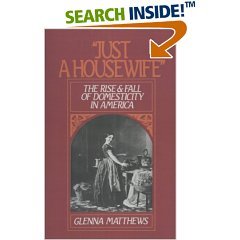"Just a Housewife"
 Glenna Matthews has chronicled the changing views of housewives in America in this book published in 1987. She asserts that the colonial home of the 1750's was taken for granted as an entity, along with the roles of men and women in the domestic sphere. By the 1830's home and the nurturing role of wives and mothers had begun to be sentimentalized, and the duties of housewives in keeping a household running smoothly and providing meals for the family were lauded.
Glenna Matthews has chronicled the changing views of housewives in America in this book published in 1987. She asserts that the colonial home of the 1750's was taken for granted as an entity, along with the roles of men and women in the domestic sphere. By the 1830's home and the nurturing role of wives and mothers had begun to be sentimentalized, and the duties of housewives in keeping a household running smoothly and providing meals for the family were lauded.Matthews calls the mid-nineteenth century the "Golden Age of Domesticity." She refers to and quotes from works by Lydia Maria Childs, Horace Bushnell, Henry Ward Beecher, Ralph Waldo Emerson, Catherine Beecher, and Harriet Beecher Stowe to support her argument.
Matthews sees industrialization as helping housewives with new inventions for cleaning and cooking, but as not helping relieve much of their labor burdens - chiefly because the automobile added the role of chauffeur to a housewife's list of duties.
From the early 1900's on until the 1980's, this book shows how the role of housewife became more and more devalued, even opposed by both men and women. The feminist movement takes some of the blame, as does the media, advertisers, and popular literature. Although I didn't agree with all of Ms. Matthews' arguments, I appreciated her attempt to show what attitudes towards housewives used to be, how those attitudes changed, and what they were when this book was written twenty years ago.
The book concludes with this:
"We cannot go back - nor would we want to - to the nineteenth-century home. But we can learn from history, and we can be sustained by the heritage of women and men like Harriet Beecher Stowe, Antoinette Brown Blackwell, and Samuel May. It seems to me that the essence of what they have to teach us is as follows: the good society and the good home are inextricably intertwined."
Labels: books


0 Comments:
Post a Comment
Subscribe to Post Comments [Atom]
<< Home